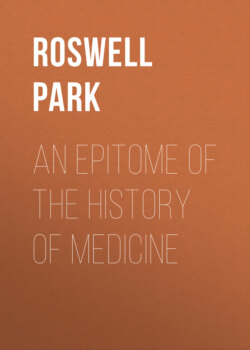Читать книгу An Epitome of the History of Medicine - Roswell Park - Страница 5
На сайте Литреса книга снята с продажи.
Original
ОглавлениеMelampus, the shepherd, having observed the purgative effects upon goats of white hellebore, gave to the young women milk in which this plant had been steeped, thereby speedily effecting a cure. Scarcely less distinguished than Melampus was Chiron. He was mainly distinguished because he was the preceptor of Æsculapius, the most eminent of early Greeks in this field. By some Æsculapius was considered the son of Apollo by the nymph Coronis.
Several cities of Greece contended for the honor of his birthplace, as they did for that of Homer. That he was famous at the time of the Argonautic expedition is seen by the fact that the twins Castor and Pollux desired him to accompany the expedition as surgeon. Be his origin what it may, Æsculapius was the leading character in medicine of all the ancients, with the possible exception of Hermes among the Egyptians; in fact, some scholars consider the two identical. Temples were erected in his honor, priests were consecrated to them, and schools of instruction were there established. It is related that Pluto, god of hell, alarmed at the diminishing number of his daily arrivals, complained to Jupiter, who destroyed the audacious healer—on which account, some wit has said, "the modern children of Æsculapius abstain from performing prodigies," But the true Æsculapians, the successors of the demigod, wrere imitated or copied by the crowd of charlatans and quacks, calling themselves theosophs, thaumaturgs, and so on, and not alone at that date, but for generations and centuries thereafter, Paracelsus and Mesmer being fair examples of this class. The poet Pindar, who lived seven or eight hundred years after Æsculapius, says that he cured ulcers, wounds, fever, and pain of all who applied to him by enchantment, potions, incisions, and by external applications. *
* Third Pythian Ode,
The followers of Æsculapius, and the priests in the temples dedicated to him, soon formed a separate caste, transmitting from one to another, as a family heritage, their medical knowledge. At first no one was admitted to practice the sacred science unless lie joined the priesthood, although later this secrecy was relaxed. They initiated strangers, provided they fulfilled the test which they made. Some kind of medical instruction was given in each temple. The three most celebrated temples to Æsculapius were that of Rhodes, already extinct by the time of Hippocrates; that of Cnidus, which published a small repertory; and finally that of Cos, most celebrated of all, because of the illustrious men who emanated from this school. In these temples votive tablets were fastened in large numbers, after the fashion of the Egyptians, the same giving the name of the patient, his affliction, and the manner of his cure. For example, such a one as this: "Julien vomited blood, and appeared lost beyond recovery. The oracle ordered him to take the pine-seeds from the altar, which they had three days mingled with honey; he did so, and was cured."
